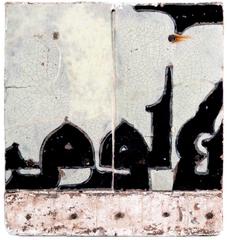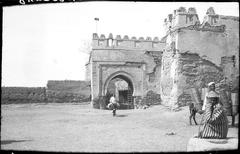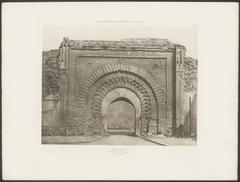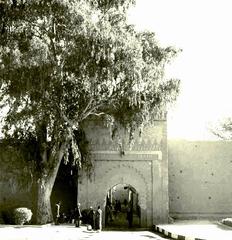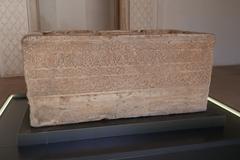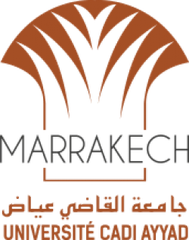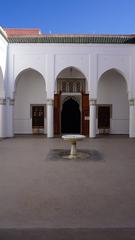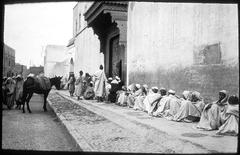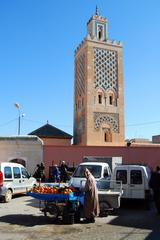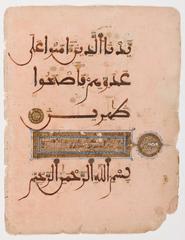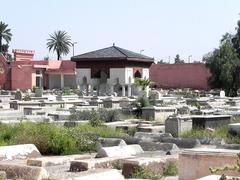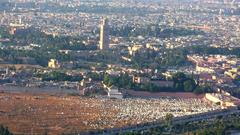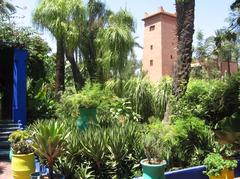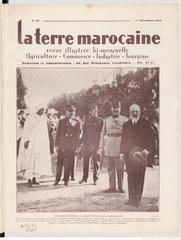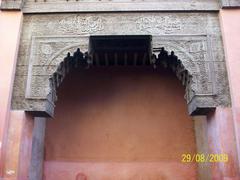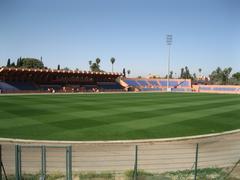Marrakesh Stadium Visiting Hours, Tickets, and Travel Guide
Date: 14/06/2025
Introduction: Marrakesh Stadium at a Glance
Situated in the heart of Marrakesh, Morocco, Marrakesh Stadium—officially the Grand Stade de Marrakech—is a modern marvel that blends cutting-edge sports infrastructure with the city’s storied cultural heritage. Since opening in 2011, the stadium has been a premier destination for major national and international sporting events, including the FIFA Club World Cup, African Championships in Athletics, and the highly anticipated Africa Cup of Nations (AFCON) 2025. The stadium’s unique rectangular design, inspired by Marrakesh’s famous “Red City” architecture, symbolizes Morocco’s commitment to merging tradition with innovation.
Easily accessible from both Marrakesh city center and Menara International Airport, the stadium welcomes sports fans, culture seekers, and tourists to enjoy football matches, guided tours, and a range of cultural events. With ongoing renovations ahead of AFCON 2025 and the 2030 FIFA World Cup, Marrakesh Stadium is evolving to provide an even better experience for visitors, while retaining its iconic architectural and cultural identity.
This comprehensive guide covers the stadium’s history, architecture, visiting hours, ticketing, travel tips, accessibility, and nearby attractions, ensuring you have all the information needed for an unforgettable visit. For official updates or digital experiences, consult resources such as the Audiala app and stadium websites (Wikipedia; Stadium Guide; CAF Online; afrikacup2025.nl).
Table of Contents
- Historical Development of Marrakesh Stadium
- Architectural Highlights and Facilities
- Visitor Information: Hours, Tickets, and Access
- Marrakesh Stadium’s Role in Local Culture
- Recent Renovations and Future Prospects
- Practical Tips: Travel, Accessibility, and Nearby Attractions
- Frequently Asked Questions (FAQ)
- Summary and Final Recommendations
- Sources
Historical Development of Marrakesh Stadium
Origins and Construction
The Grand Stade de Marrakech was conceived as a replacement for the outdated Stade Al Harti, marking Morocco’s ambition to host major international events. Construction began in September 2003, spanning over seven years, and the stadium was inaugurated on January 5, 2011. Its debut event was a tournament featuring local club Kawkab Marrakech alongside international teams, cementing its place on the sporting map (Wikipedia; Stadium Guide).
Sporting Legacy
Since its inauguration, Marrakesh Stadium has hosted a variety of high-profile events, including the 2013 and 2014 FIFA Club World Cup finals, the 2014 African Championships in Athletics, and multiple national team matches. It is home to Kawkab Marrakech and a regular venue for CAF competitions. The stadium will play a central role in AFCON 2025 and is a candidate venue for the 2030 FIFA World Cup (CAF Online).
Architectural Highlights and Facilities
Distinctive Design
Marrakesh Stadium stands out for its rectangular shape—unusual among modern stadiums—reflecting the city’s historic red walls and medina. The design was spearheaded by Gregotti Associati International, incorporating thick walls, towers, and red hues that echo Marrakesh’s architectural heritage (Ghana News Agency; Stadium Guide).
Modern Features
- Seating Capacity: Originally 41,245, expanded for AFCON 2025 and headed towards 70,000 by 2028 (afrikacup2025.nl).
- Multi-purpose Use: Equipped for football and athletics with a running track (track to be removed for football-specific conversion).
- Media Facilities: Space for over 1,000 journalists, digital screens, and advanced lighting.
- Accessibility: Wheelchair areas, ramps, accessible restrooms, and parking.
- Sustainability: Ongoing renovations include solar panels, water-saving systems, and eco-friendly materials.
Visitor Information: Hours, Tickets, and Access
Visiting Hours
- Event Days: Gates generally open 2–3 hours prior to kickoff.
- Non-Event Days: Guided tours may be available by appointment or during tourist seasons. Standard hours are typically 9:00 AM–6:00 PM, but always confirm with the stadium in advance.
Tickets
- Where to Buy: Official event websites, authorized outlets, and the stadium box office.
- Digital Tickets: Supported for major events.
- Prices: Vary by event and seating; early purchase recommended for high-demand fixtures (afrikacup2025.nl; official stadium site).
Getting There
- By Taxi: The most convenient option from city center (approx. 11 km) and Menara Airport (14 km).
- Public Transit: Buses and event-day shuttles are available.
- Parking: On-site spaces may be limited during renovations—public transport is advisable.
Marrakesh Stadium’s Role in Local Culture
The stadium is more than a sporting venue; it’s a landmark integrated into Marrakesh’s cultural identity. Its architecture pays tribute to traditional Moroccan motifs, and it frequently hosts concerts, festivals, and community events. The stadium’s atmosphere is vibrant, especially during high-profile matches, with Moroccan fans renowned for their passionate support (CAF Online).
Recent Renovations and Future Prospects
Upgrades for AFCON 2025 and FIFA World Cup 2030
- Capacity Expansion: Increased to 55,389 for AFCON, with a target of 70,000 for the World Cup (afrikacup2025.nl; footballgroundguide.com).
- Football-Specific Conversion: Removal of athletics track and lowering of the pitch to bring fans closer to the action.
- New Roof: Canopy installation by 2028 for full spectator coverage.
- Enhanced Facilities: Upgraded VIP suites, press areas, concessions, security, and digital amenities.
- Sustainability: Emphasis on solar energy and eco-friendly construction.
Timeline
- 2023–2025: Phase 1 renovations (for AFCON).
- 2025–2028: Phase 2 for World Cup readiness; expect limited access to some areas during construction (afrisportnews.com).
Practical Tips: Travel, Accessibility, and Nearby Attractions
Travel and Accessibility
- Transport: Arrange taxis or shuttles in advance, especially on event days.
- Dress Code: Modest clothing is recommended, especially for women; lightweight fabrics are ideal in summer (globalhighlights.com).
- Safety: Security is robust. Arrive early to avoid queues and allow time for bag checks.
Nearby Attractions
- Jemaa el-Fnaa: The city’s famous square, filled with street performers and markets.
- Majorelle Garden: A lush oasis of art and nature.
- Koutoubia Mosque, Bahia Palace, and the medina: Historic sites reflecting Marrakesh’s legacy (thecrazytourist.com).
- Local Cuisine: Enjoy tagines, mint tea, and street food outside or near the stadium (thewholeworldisaplayground.com).
Frequently Asked Questions (FAQ)
Q: What are Marrakesh Stadium’s visiting hours?
A: On event days, gates open 2–3 hours before kickoff. Guided tours may be available by appointment on non-event days; confirm with the stadium.
Q: How do I purchase tickets?
A: Buy online via official event sites, at authorized outlets, or the stadium box office. Early booking is advised for major matches.
Q: Is the stadium accessible for disabled visitors?
A: Yes, with ramps, elevators, accessible seating, and restrooms.
Q: What is the best way to reach the stadium?
A: Taxis, public buses, and shuttles are available; driving is possible but parking may be limited during events or construction.
Q: Are there guided tours?
A: Yes, often available by request or during off-peak times; check local listings or contact stadium administration.
Summary and Final Recommendations
Marrakesh Stadium is an emblem of Morocco’s fusion of modernity and tradition, offering world-class sports and entertainment in an architecturally distinct setting. With ongoing renovations, expanded capacity, and enhanced fan experiences, it is poised to play a central role in global events like AFCON 2025 and the 2030 FIFA World Cup.
For visitors, the stadium offers accessible facilities, engaging tours, and integration with Marrakesh’s vibrant cultural and historical landscape. Plan your visit by checking official schedules, purchasing tickets in advance, and exploring nearby attractions to make the most of your trip.
Stay updated through official sources, the Audiala app, and social media for the latest news, event schedules, and visitor tips.
